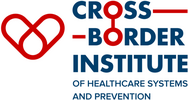CBI Scientific Coordinators
Groningen:
Oldenburg:
Research Focus Areas
The research approach within the CBI is to address health challenges within the Northern Dutch-German cross-border region, with the goal of identifying best health and care practices on each side of the border. Special attention is given to vulnerable populations.
The three research focus areas of the CBI are:
Sustainable and Resilient Health Systems
Decentralized healthcare, access to healthcare, home-based care, family and community care.
Health Data and Healthcare Innovations
Health data sharing, high-tech medicine, telemedicine, robotics, e-health, big data and AI applied to health challenges.
Prevention
Infectious and non-infectious diseases, preventive diagnostics, health literacy, healthy aging.

